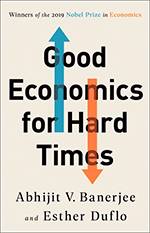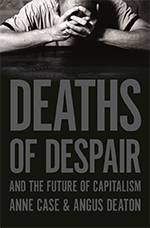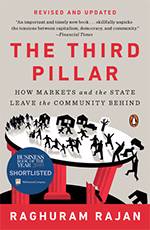Pinelopi Koujianou Goldberg
Says More…
This week in Say More, PS talks with Pinelopi Koujianou Goldberg, Professor of Economics at Yale University and a former World Bank Group chief economist.
Project Syndicate: You recently observed that women’s careers have suffered disproportionately during the pandemic, and argued for flexible work schedules and free childcare to help women in the longer term. But what about the short term? As you note, “job losses during downturns have long-lasting effects, because the unemployed tend to lose relevant job skills and professional connections over time.” For example, women in academia have reported a significant decrease in manuscript submissions – a lapse that can put them significantly behind their male colleagues. Are there targeted measures that can mitigate women workers’ pandemic losses and reverse them faster?
Pinelopi Koujianou Goldberg: Targeted measures need to be context-specific. Let me use academia as an example, as you have. A helpful short-term measure would be to slow down tenure or promotion clocks for women with children at home, giving them time to make up for the interruption to their efforts to build up their research credentials. Alternatively (or in addition), women with children could be granted temporary reductions of their teaching loads and administrative responsibilities. This would enable them to keep up (or catch up) in other areas, such as publications.
Such measures sound easy enough to implement, yet they are highly controversial. Many well-meaning employers, especially universities, pride themselves on having adopted gender-neutral policies (for example, by offering paternal leave). One can certainly understand the rationale behind a gender-neutral approach, and there is no question that many men are actively involved in housework and childcare these days. Yet research has shown that, at least in economics, this approach has not only put women academics at a disadvantage; it has advanced the careers of male economists, often at women’s expense.
Goldberg recommends
We ask all our Say More contributors to tell our readers about a few books that have impressed them recently. Here are Goldberg's picks:
-

Good Economics for Hard Times
by Abhijit V. Banerjee and Esther Duflo
When Nobel laureates Banerjee and Duflo wrote about “hard times” in their 2019 book, they had no idea how hard 2020 would be. Yet their insights are as relevant for the management of the COVID-19 crisis as they are for the many topics the book covers, such as slowing growth and rising inequality, technology and globalization, immigration, and climate change. In each case, they carefully review and present existing evidence, always based on cutting-edge research, and show how economic research can meaningfully inform policy. Their views on the demonization of the poor and the role of incentives, in particular, strike a chord today, as the US Congress debates the merit of further relief payments to those in need.
-

Deaths of Despair and the Future of Capitalism
by Anne Case and Angus Deaton
Although the book is less than one year old, the phrase “deaths of despair” – meaning deaths due to suicide, drug overdose, and alcoholism – has become part of our collective vocabulary. Case and Deaton offer a set of novel, striking, and thought-provoking facts: life expectancy has been declining in the US, but not in other high-income countries, over the last few years; mortality rates have increased among white, male, blue-collar workers; and unemployment seems to be most important socioeconomic driver of this phenomenon. The authors tie the health crisis to the rise of large corporations, the weakening of labor, and the many limitations of the US health-care system. Their analysis gets to the heart of many of the grievances that have driven the rise of populism.
-

The Third Pillar: How Markets and the State Leave the Community Behind
by Raghuram Rajan
Economists have long wondered why the public resists policies that benefit the economy as a whole, such as opening up to trade and immigration. Recent research has emphasized the impact of municipality- or commuting-zone-level effects: policies with positive effects in the aggregate may still affect different local communities very differently. Rajan builds on this idea in a penetrating analysis of the interdependence of a society’s three pillars: markets, the state, and community. He shows how the decline of communities goes hand in hand with the breakdown of social structures and loss of identity. In the spirit of Deaths of Despair, the book ties these phenomena to the recent decline of rural, white, blue-collar communities in the US and the rise of populism.
From the PS Archive
From 2019
In “What Next for Global Trade?”, Goldberg considers past episodes of US protectionism, and suggests why this time might be different. Read more.
From 2020
In “The New Empty Argument Against Trade,” Goldberg shows why the pandemic has not strengthened the case for domestic production over global supply chains. Read more.
Around the web
Goldberg and co-author Tristan Reed explain their model for poverty reduction in an era of decreasing international trade. Read the article.
As part of its CoronaNomics video series, EconFilms hosts a discussion with Goldberg and Dani Rodrik on the past, present, and future of globalization. Watch the video.
